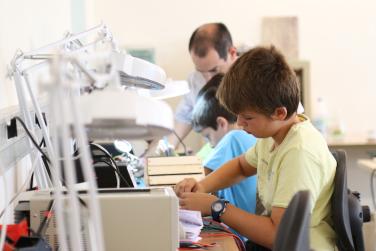
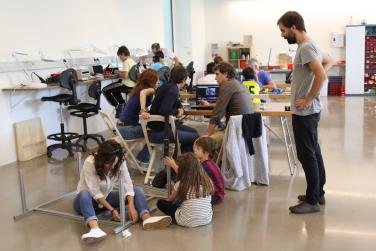
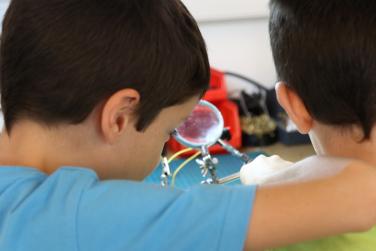
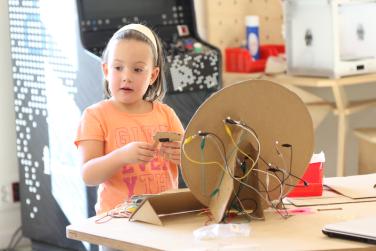
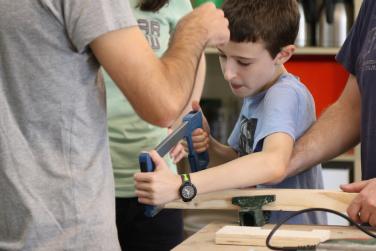
Following the philosophies of Do It Yourself (DIY) and Do It With Others (DIWO), we will create the Do It In Family format. We will work on self-learning and cooperative learning, together, with each individual sharing their knowledge, learning about and experimenting with diverse subjects. In fact, one of the reasons for this format change is the desire of many families to continue expanding on the knowledge acquired during these workshops.
We will work as a family, as well as "in families", promoting everyone's collaboration. Collaboration among adults and the little ones will be essential when it comes to dividing up tasks, with the intention of offering space and responsibilities to the children.
The projects that will be developed over the course of three months will be chosen among everyone involved after getting to know the interests and desires of each participant. We will learn about the technology we usually work with, and we will apply it to our projects.
It will be a continuous project, so that when a project finds its stride, new projects and families will be incorporated. During registration, a wait list will be created, and when some families stop attending, or when the group becomes autonomous, new members will be incorporated. One of the final goals is to create a community of families that enjoy doing things together.
Do It in Family (DIF) - The Ten Commandaments
1 / LEARNING BY DOING
The best way to learn is by using what we learn to do things that we like.
2 / DOING IT TOGETHER
We are all necessary and useful. We can all contribute, and we can all teach. The projects we do, we will do together, without leaving anyone out or working alone.
3 / LEARNING HOW TO LEARN
We don't know everything, and there won't always be someone there to teach us. Sometimes we will have to go through the process of self-learning.
4 / HAVING FUN
No one is required to be here, so one of the most important things is to have fun. That doesn't mean that we don't have to work hard. Often times, hard work gives us satisfactory results.
5 / DECIDING TOGETHER
Other people's opinions will be taken into account. Together, we will decide what projects to develop and what steps to take.
6 / SHARING AND TEACHING
We will share our knowledge and teach what we have learned to others. One of the project's baselines will be teamwork.
7 / TAKING THE TIME NEEDED FOR EACH PROJECT
When we rush things, they don't usually turn out well. The goal isn't to finish as fast as possible. If no one gives you a task, be pro-active, that way you won't get bored!
8 / THINGS DON'T ALWAYS TURN OUT RIGHT THE FIRST TIME
The most important things don't tend to turn out right the first time. Take your time to see what went wrong and fix it. Allow yourself the freedom to make mistakes.
9 / USING TECHNOLOGY AS A MEANS OF CREATION
Technology is not the goal, it is the means. Learn what you can use technology for, and dedicate time to design and preparation. Technology isn't a way of doing things faster, it is a tool that gives us more time to think.
10 / WE ARE THE SPACE, YOU ARE THE IDEAS
“The role of the teacher is to create the conditions for invention rather than provide ready-made knowledge.” Seymour Papert. We offer the environment, you provide the ideas.
Hiruhileko honetan ere Do It in Family (DIF), Egizu familian, formatuarekin jarraituz, prozesu berri bat abiatuko dugu. Egizu Zuk Zeuk (DIY) eta Egizu Gainerakoekin (DIWO) filosofietan oinarrituz, eta Egizu Familian (DIF) formatoa sortu dugu. Autoikaskuntza eta ikasketa kooperatiboa landuko ditugu, denon artean, bakoitzak dakiguna irakatsiz, gai desberdinak ikasi eta esperimentatuko ditugu.
